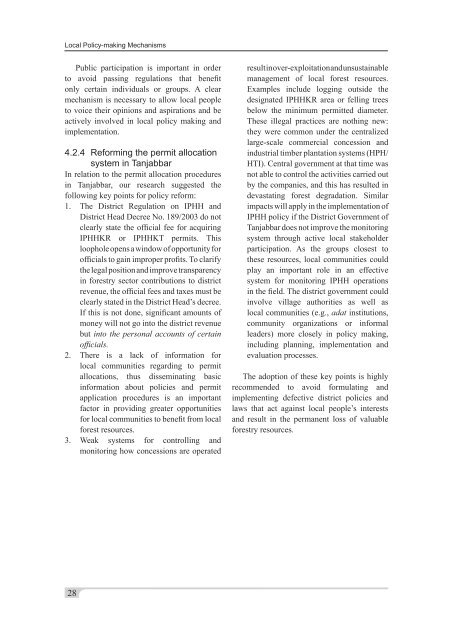Local policy-making mechanisms - Forest Climate Center
Local policy-making mechanisms - Forest Climate Center
Local policy-making mechanisms - Forest Climate Center
Create successful ePaper yourself
Turn your PDF publications into a flip-book with our unique Google optimized e-Paper software.
<strong>Local</strong> Policy-<strong>making</strong> MechanismsPublic participation is important in orderto avoid passing regulations that benefitonly certain individuals or groups. A clearmechanism is necessary to allow local peopleto voice their opinions and aspirations and beactively involved in local <strong>policy</strong> <strong>making</strong> andimplementation.4.2.4 Reforming the permit allocationsystem in TanjabbarIn relation to the permit allocation proceduresin Tanjabbar, our research suggested thefollowing key points for <strong>policy</strong> reform:1. The District Regulation on IPHH andDistrict Head Decree No. 189/2003 do notclearly state the official fee for acquiringIPHHKR or IPHHKT permits. Thisloophole opens a window of opportunity forofficials to gain improper profits. To clarifythe legal position and improve transparencyin forestry sector contributions to districtrevenue, the official fees and taxes must beclearly stated in the District Head’s decree.If this is not done, significant amounts ofmoney will not go into the district revenuebut into the personal accounts of certainoffi cials.2. There is a lack of information forlocal communities regarding to permitallocations, thus disseminating basicinformation about policies and permitapplication procedures is an importantfactor in providing greater opportunitiesfor local communities to benefit from localforest resources.3. Weak systems for controlling andmonitoring how concessions are operatedresult in over-exploitation and unsustainablemanagement of local forest resources.Examples include logging outside thedesignated IPHHKR area or felling treesbelow the minimum permitted diameter.These illegal practices are nothing new:they were common under the centralizedlarge-scale commercial concession andindustrial timber plantation systems (HPH/HTI). Central government at that time wasnot able to control the activities carried outby the companies, and this has resulted indevastating forest degradation. Similarimpacts will apply in the implementation ofIPHH <strong>policy</strong> if the District Government ofTanjabbar does not improve the monitoringsystem through active local stakeholderparticipation. As the groups closest tothese resources, local communities couldplay an important role in an effectivesystem for monitoring IPHH operationsin the field. The district government couldinvolve village authorities as well aslocal communities (e.g., adat institutions,community organizations or informalleaders) more closely in <strong>policy</strong> <strong>making</strong>,including planning, implementation andevaluation processes.The adoption of these key points is highlyrecommended to avoid formulating andimplementing defective district policies andlaws that act against local people’s interestsand result in the permanent loss of valuableforestry resources.28

















